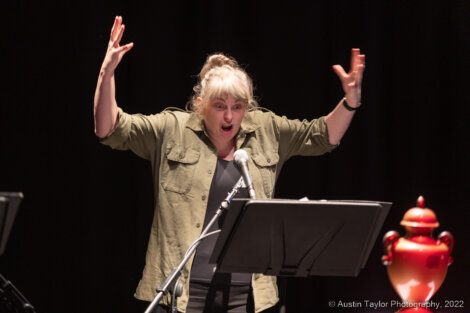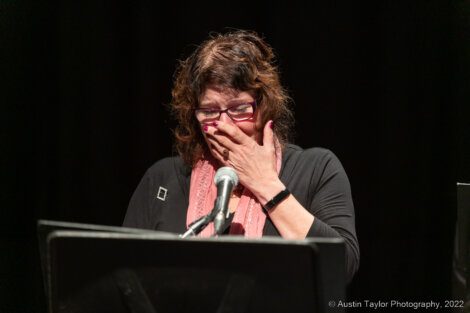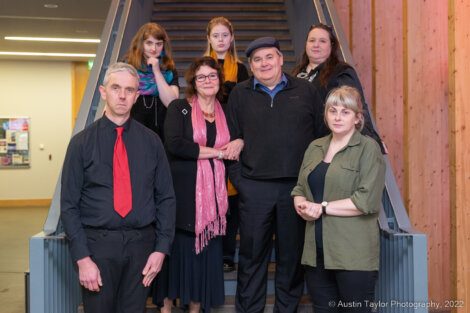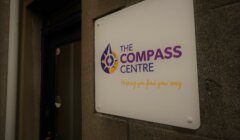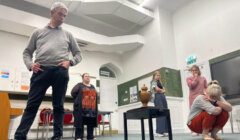Reviews / Shining a light into the darkness
Helen Kerr reviews Pollyanna Paradox, an original audio play exploring the felt impact of coercive control on a family, with creative input from survivors of domestic abuse.
HOW DO you expose those things which hide in darkness? Surely you shine a light on them. And then you shine it again. And again and again and again until the darkness is no longer a safe place to hide.
As part of this year’s 16 Days of Activism Against Gender Based Violence, Islesburgh Drama Group performed local playwright Stephenie Georgia’s audio play Pollyanna Paradox.
In partnership with Shetland Women’s Aid and the Compass Centre, the story told of the experiences of Polly, a survivor of domestic abuse. Importantly, Georgia has also taken creative input from domestic abuse survivors in Shetland.
In all honesty, watching an audio play was a bit of a revelation. For a start, the other recent audio plays performed by Islesburgh Drama Group came from a new creative direction for the company during the height of Covid. These were very much audio, broadcast on local radio. Such drama affords you the privilege – and perhaps frustration – of having to fill in many blanks as you listen. What does this character look like? How did they seem when they said that? However, watching a live performance of an audio play filled in a number of such blanks.
Protagonist Polly, played by Lynsey Rendall, has gone back to a villa in Spain she had with her deceased husband. Along the way, we meet her daughter Charlie – and her pregnant partner Sophie – as well as her parents Agnes and Bobby.
On the face of it, Polly seems to be coping well with life’s hurdles. But the more we meet the rest of her family – and are party to the posthumous voice of her husband – the more we see the struggles she has had to overcome to even be able to put on the semblance of all things being well.
Become a member of Shetland News
Rendall is a persuasive and convincing Polly. Her voice is at once controlled and strained as family life – with all its ups and downs – become apparent. The presence of her mother, who brings with her an ever-cheerful, perpetually optimistic perspective, shows how difficult it is between treading the line between acknowledging reality and not letting reality weigh you down.
However, in the case of Polly, the constant need to always find “something to be glad about” has become the very darkness that allowed her abusive husband to thrive.
Polly’s mother, Agnes, performed by Lesley Leslie, was not the villain however. She brought light relief as she, and Polly’s father Bobby (played by David Smith), bumbled their way through arriving at the villa and typifying parents of their generation.
Again, however, Georgia’s writing had us on that tightrope of realising that Polly’s gentle, unassuming parents were both endearing and culpable for what had happened to Polly.
There were two significant punctuations throughout the play. One was the narrative voice of Karen Erasmuson, whose usual role with Islesburgh Drama Group has been as props coordinator. However, being able to take part in radio plays with the group has given her confidence and as such she played the Voice of Creation, interjecting throughout the play with readings from the Book of Genesis from the Bible.
Her voice was both masterful and resounding. I confess, I was a little lost at first with why the biblical account of creation was being used throughout the play, but Erasmuson’s reading of it still brought weight to the play as a whole, as Polly took part in a recreation of herself throughout the course of the play.
The second series of interruptions to the narrative came from the voice of Kevin Briggs as Charles, the coercive husband Polly was finally free of. Providing what appeared to be both a narration of how he used manipulation and control as well as an interior monologue for Polly, his voice was scathing, mocking, degrading and laced with verbal detonation.
Briggs, through his character, illustrated how control and manipulation can come through even the most seemingly innocent of comments and remarks. His lines were appropriately accompanied by repetitive sinister music, and harsh pink lighting.
Sophie and Charlie, performed respectively by Lorraine Peterson and Amber Thomson, were fully representative of the modern generation. With control and poise, Thomson near enough stole the show for me. Her voice, expression, stature captured her character perfectly, while Peterson also put on a convincing performance.
As each character spoke, a light revealed them – this was not always as slick as it could have been as there were moments when it seemed there may be symbolic darkness and light, but it wasn’t always clear. An array of sounds to support the action were used to great effect, enabling us to concentrate on the voices, the faces, of those whose story we were there to hear.
Georgia has done a tremendous work here. Drama is fitting for many things – for entertainment and joy, for fun and laughter – but also for story and truth-telling.
For making silent voices audible, and to shout light into the darknesses. My sincere hope is that dramas such as these enable those watching audiences to recognise how people can hide in the shade as perpetrators, but also how recognition and exposure can lead to survival and hope.
The original Pollyanna may have looked endlessly for something to be glad about, but hopefully we can work together to look endlessly for those who need a way out and give them the helping hands they need.
Pollyanna Paradox was performed by Islesburgh Drama Group at Mareel last Friday. It was recorded and will be broadcast on BBC Radio Shetland on Thursday (1 December) at 6pm.
The 16 Days of Activism against Gender Based Violence is an annual international campaign to challenge gender-based violence around the world. It runs from 25 Nov (The International Day for the Elimination of Violence Against Women) to 10 Dec (Human Rights Day).
The consequences of gender-based violence are devastating and can have life-long repercussions for survivors. A society that tolerates harmful gender norms that lead to violence is not a society that is safe for anyone.
Useful contact details:
Shetland Women’s Aid: office@shetlandwa.org, phone 01595 692070 or contact them via Facebook, Instagram or Twitter
Compass Centre: contact@compasscentre.org, phone 01595 747174 or the Rape Crisis Scotland helpline on 08088 010302
Scotland’s 24 hour Domestic Abuse and Forced Marriage Helpline is available on 0800 027 1234, email helpline@sdafmh.org.uk or by visiting sdafmh.org.uk.
Become a member of Shetland News
Shetland News is asking its readers to consider paying for membership to get additional perks:
- Removal of third-party ads;
- Bookmark posts to read later;
- Exclusive curated weekly newsletter;
- Hide membership messages;
- Comments open for discussion.
If you appreciate what we do and feel strongly about impartial local journalism, then please become a member of Shetland News by either making a single payment, or setting up a monthly, quarterly or yearly subscription.




